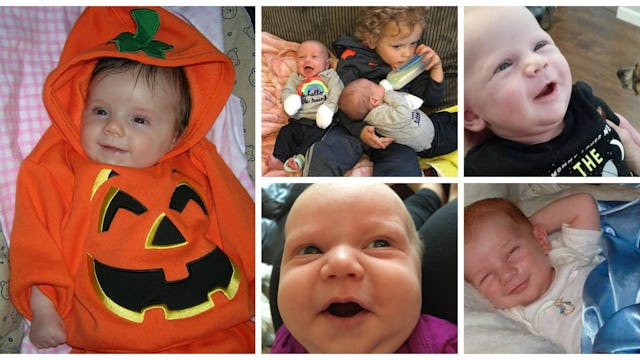New Research Shows Newborn Smiles Are REAL Smiles

Like many new parents, I spent almost every second of my newborns’ lives (well, when they weren’t sleeping or eating, which was like 90% of the time) staring at their little faces. I mean, that tiny, squishy nose, those itty-bitty eyelashes.
And, oh my goodness, was that a smile? Oh yes, yes it was.
Except if I were to loudly proclaim that my newborn was smiling, someone would always chime in with, “Oh, it’s just a reflex. Newborns can’t smile.” Or, “No, silly. That’s just gas.”
What did I know? All the books I read said that newborns don’t really smile. They have no clue what’s even going on, right? Secretly, though, I was sure my babies were smiling at me, because I swear it would happen sometimes after I smiled at them! They were obviously responding to the mama-love that was exuding out of all my pores.
Well, it turns out I’m not the only one who believes that newborn smiles are real. Emese Nagy, an M.D., psychologist, and researcher from the University of Dundee writes in The Conversation that newborn smiles aren’t “just reflexes,” and may be indicative of emotional reactions babies are experiencing – even in those first few days and weeks of life.
Nagy explains that for most of human history, babies were thought to be these reflexive little blobs who didn’t really have an ability to express or regulate their emotions and didn’t experience what you think of as social interaction.
However, that interpretation is changing, says Nagy. Babies can feel pain at the same level as adults. They have the ability to self-regulate. If they are overstimulated, they will fall asleep to shut out the stimulation. If they have a need, they will cry to let you know (oh yes, they most certainly will).
And according to Nagy, they initiate their own smiles as early as the first 36 hours of life.
Nagy, who has pored through much of the data out there on this subject, says there has always been evidence that newborn smiles were emotional and responsive.
“There have long been signs that newborn smiles could signal positive emotions to some extent,” she says. “Smiles have been noted in the first few days of life as a response to stroking of the cheek or the belly. Newborns also smile in response to sweet tastes and smells.”
The reason why researchers never believed these smiles counted, though, says Nagy, is because they said that these smiles actually looked different than social smiles. “Real” smiles, according to researchers, involved not just the mouth, but also the muscles around the eyes – kind of like how you crinkle up your eyes when you smile.
For a long time, researchers had observed that newborn smiles – even if they seemed social in nature – only involved the mouth muscles, and were therefore not “real” smiles. That is changing, however, says Nagy, because it appears that other muscles actually are involved in these smiles.
“[B]abies often start with moving their cheeks and their brows before they smile, as if focusing their attention on the caregiver’s face,” she explains. “So it is completely possible that these newborn babies actually mean to smile.”
What’s more, she says, there continues to be ample evidence these smiles are meaningful, purposeful, and in direct response to a loving gesture from a caretaker.
“Babies learn about the power of smiling early,” Nagy says. “While caregivers often smile at their newborns, this behaviour will be dependent on the baby’s state – they are less likely to smile if the baby is crying. As a result, babies quickly gain a remarkable ability to regulate the behaviour of their parents. If a baby keeps eye contact, blinks and smiles, their parent will likely smile back – making the smile rewarding.”
Totally intriguing stuff, right?
It’s cool to have some research on our side, but honestly, however you interpret the data, I think most of us moms know in our hearts those smiles are as real as they get – and when we see our newborn smiling right up at us, it’s pretty much better than any drug in the world.
Now excuse me while I go look at baby pictures of my kids, freak out about how quickly the time has passed, and sob over their sweet little smiling faces.
This article was originally published on